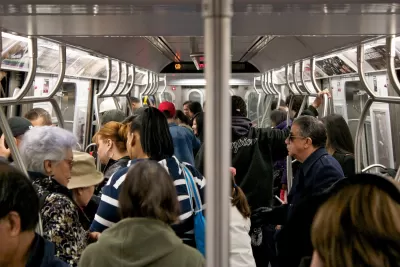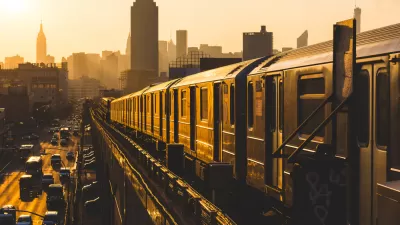The agency plans to negotiate new options for operational funding as farebox and toll revenue lingers far below pre-pandemic levels.

With ridership plateauing at roughly 60 percent of pre-pandemic levels, New York City’s Metropolitan Transportation Authority (MTA) will meet with lawmakers and labor leaders to discuss potential new sources of funding for the agency, which, in the past, depended on ridership revenue for half of its operating costs. If current levels of farebox and toll revenue hold steady, MTA faces a $2.6 billion budget shortfall in 2025, reports Michelle Kaske in Bloomberg CityLab.
According to a quote from Rachael Fauss of Reinvent Albany, “The best case is that they get new, ongoing, dedicated state aid. Not sort of a one-shot thing because the problem of reduced ridership isn’t going away anytime soon.”
Potential options for new funding sources include new sales taxes, a common funding method in other cities such as Los Angeles, where sales taxes make up 80 percent of operational funding. Revenue will also come from the MTA’s planned congestion pricing system, which will launch in late 2023 or 2024.
As Kaske notes, “If the agency doesn’t find new funding it would be forced to reduce service and boost fares higher than already planned. That means commuters would have to pay more to ride and wait longer for trains that break down more often.” MTA board member Andrew Albert rejects the idea, saying “I don’t think cutting service gets us anywhere.” Albert continues, “It then means fewer riders will opt for the system, which means you begin that downward spiral of death -- fewer riders means the deficit grows even more.”
FULL STORY: New York’s MTA Shops for New Funding as Fare Revenue Dwindles

Maui's Vacation Rental Debate Turns Ugly
Verbal attacks, misinformation campaigns and fistfights plague a high-stakes debate to convert thousands of vacation rentals into long-term housing.

Planetizen Federal Action Tracker
A weekly monitor of how Trump’s orders and actions are impacting planners and planning in America.

In Urban Planning, AI Prompting Could be the New Design Thinking
Creativity has long been key to great urban design. What if we see AI as our new creative partner?

King County Supportive Housing Program Offers Hope for Unhoused Residents
The county is taking a ‘Housing First’ approach that prioritizes getting people into housing, then offering wraparound supportive services.

Researchers Use AI to Get Clearer Picture of US Housing
Analysts are using artificial intelligence to supercharge their research by allowing them to comb through data faster. Though these AI tools can be error prone, they save time and housing researchers are optimistic about the future.

Making Shared Micromobility More Inclusive
Cities and shared mobility system operators can do more to include people with disabilities in planning and operations, per a new report.
Urban Design for Planners 1: Software Tools
This six-course series explores essential urban design concepts using open source software and equips planners with the tools they need to participate fully in the urban design process.
Planning for Universal Design
Learn the tools for implementing Universal Design in planning regulations.
planning NEXT
Appalachian Highlands Housing Partners
Mpact (founded as Rail~Volution)
City of Camden Redevelopment Agency
City of Astoria
City of Portland
City of Laramie





























